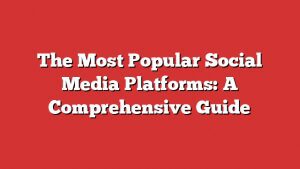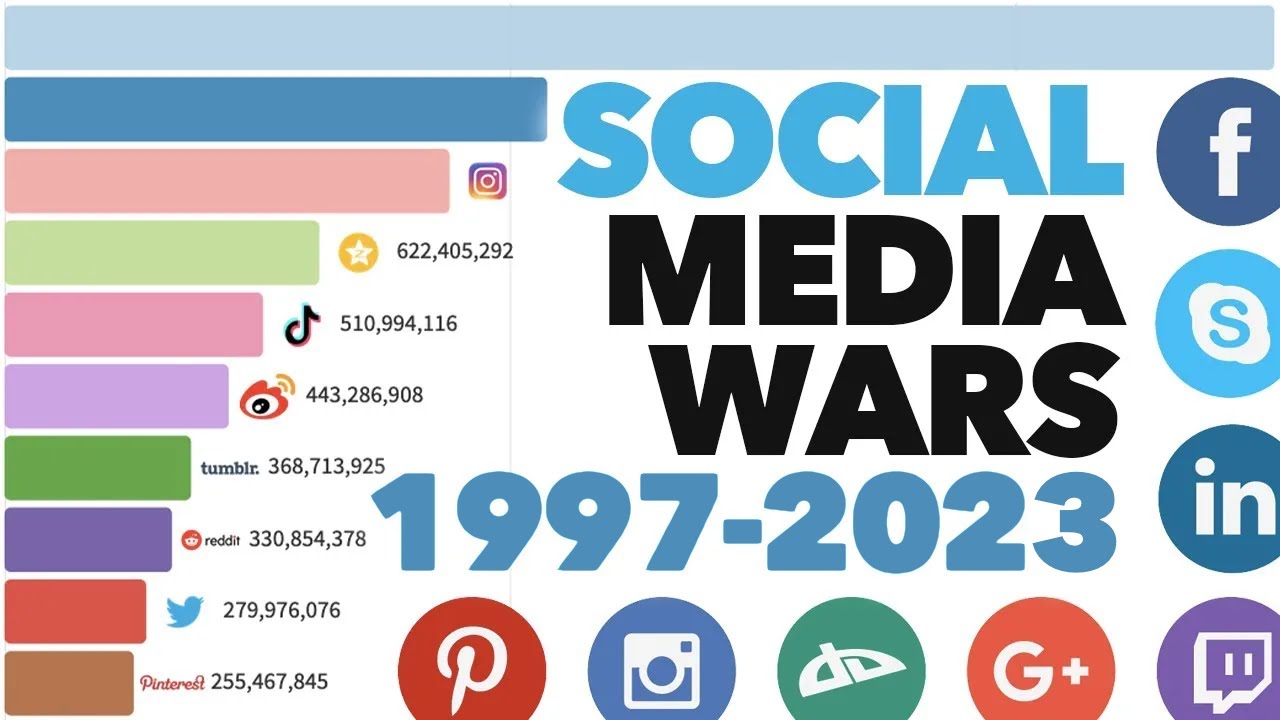In a world where social connection knows no boundaries, the rise of social media platforms has revolutionized the way we communicate and share our lives.
From Facebook to Instagram, Snapchat to TikTok, these virtual landscapes have become the playgrounds of millions, offering endless opportunities for connection, self-expression, and discovery.
Join us as we delve into the vibrant world of the most popular social media platforms, where possibilities are limitless and communities thrive.
| Item | Details |
|---|---|
| Topic | The Most Popular Social Media Platforms: A Comprehensive Guide |
| Category | Ads |
| Key takeaway | In a world where social connection knows no boundaries, the rise of social media platforms has revolutionized the way we communicate and share our lives. |
| Last updated | December 29, 2025 |
most-popular-social-media-platforms">most popular social media platforms
The most popular social media platforms are Facebook, YouTube, WhatsApp, Instagram, and WeChat.
These platforms have the highest number of monthly active users, with Facebook leading the pack at 2,794 million, followed by YouTube with 2,291 million, WhatsApp with 2,000 million, Instagram with 1,229 million, and WeChat with 1,213 million monthly active users.
These platforms provide a wide range of features and functionalities for users to connect, share content, and communicate with each other.Key Points:
- Facebook, YouTube, WhatsApp, Instagram, and WeChat are the most popular social media platforms.
- Facebook has the highest number of monthly active users, followed by YouTube, WhatsApp, Instagram, and WeChat.
- These platforms offer various features and functionalities for users to connect, share content, and communicate.
- Facebook has 2,794 million monthly active users.
- YouTube has 2,291 million monthly active users.
- WhatsApp has 2,000 million monthly active users.
Check this out:
💡 Did You Know?
1. Despite being immensely popular today, Facebook was initially limited to only Harvard University students when it was first created in 2004 by Mark Zuckerberg. It later expanded to other universities, and eventually became available to the public in 2006.
2. Twitter was almost named “Friendstalker” before its Co-founder, Biz Stone, suggested the name “Twitter.” Initially, Stone’s suggestion didn’t receive much enthusiasm, but it eventually won out, leading to one of the most recognizable social media platforms worldwide.
3. YouTube was founded by three former PayPal employees in February 2005. The website was originally intended to be an online dating platform called “Tune In, Hook Up.” However, it pivoted to become a platform for sharing and watching videos, quickly gaining popularity.
4. Instagram originally began as a location-based app called Burbn, which allowed users to check-in to locations similar to Foursquare. However, it was rebranded as Instagram, primarily focusing on photo-sharing with various filters, and quickly became one of the leading social media platforms.
5. Snapchat was first developed in 2011 as a class project by students at Stanford University. Initially, the app was known as “Picaboo,” allowing users to send photos that disappeared after a short period. It was later renamed Snapchat and expanded to include various features such as video sharing, filters, and Stories.
Facebook – 2,794 Million
Facebook is undoubtedly the king of social media platforms, boasting a staggering 2,794 million monthly active users worldwide. With its inception in 2004, Mark Zuckerberg revolutionized the way people connect and share information online. From its humble beginnings as a platform for college students, Facebook has evolved into a global phenomenon that transcends borders, connecting people from all walks of life.
One of the reasons behind Facebook’s immense popularity is its user-friendly interface, which allows individuals to effortlessly connect with friends and family, post updates, share photos and videos, and engage with a wide range of content. Additionally, Facebook’s powerful algorithm ensures that users are presented with content that aligns with their interests, making it a personal and tailored experience.
Furthermore, Facebook’s continuous efforts to expand its features have contributed to its sustained growth. With the acquisition of Instagram and WhatsApp, Facebook has solidified its dominance in the social media landscape, providing users with a seamless integration of platforms and a wide array of communication and content-sharing options.
However, despite its popularity, Facebook has faced significant criticism regarding privacy concerns and the proliferation of fake news. Nonetheless, it remains the go-to platform for connecting and staying updated with friends, family, and even brands, making it an essential part of the social media landscape.
Fresh tips added for marketers this month.
Youtube – 2,291 Million
YouTube, the video-sharing platform launched in 2005, has become an integral part of the digital world, attracting a massive user base of 2,291 million monthly active users. With its vast collection of user-generated and professional content, YouTube offers a diverse range of videos catering to various interests, from educational tutorials to entertaining vlogs and music videos.
The platform’s popularity can be attributed to its accessibility, allowing anyone with an internet connection to upload and share videos. This democratization of content creation has allowed individuals and brands to reach a global audience, creating viral sensations and launching careers. Moreover, YouTube’s recommendation algorithm offers personalized video suggestions based on users’ viewing patterns, keeping them engaged and connected to their favorite content creators.
YouTube’s influence goes beyond entertainment. It has become a significant educational resource, with tutorials, lectures, and documentaries available on virtually any subject. Many businesses and influencers also utilize YouTube as a promotional tool to showcase products, share expertise, and build a loyal following.
However, YouTube has faced its fair share of controversies, such as issues related to copyright infringement, inappropriate content, and the platform’s monetization policies. Despite these challenges, YouTube remains an essential platform for entertainment, social engagement, and knowledge-sharing, solidifying its position as one of the most popular social media platforms globally.
Whatsapp – 2,000 Million
WhatsApp, founded in 2009, has evolved into one of the most popular communication platforms, attracting a massive user base of 2,000 million monthly active users. What sets WhatsApp apart from other messaging services is its emphasis on privacy and end-to-end encryption, providing users with a secure and private communication channel.
With its intuitive and user-friendly interface, WhatsApp allows individuals to send text messages, make voice and video calls, and share multimedia content with ease. The platform’s group chat feature also enables users to stay connected with multiple people simultaneously, making it an ideal tool for socializing, collaborating, and organizing events.
WhatsApp’s popularity can be attributed to its cross-platform compatibility, ensuring seamless communication across different devices and operating systems. Additionally, the platform’s free messaging and voice call services have made it particularly appealing in regions with limited internet connectivity or expensive SMS and call rates.
Furthermore, WhatsApp’s integration with Facebook has expanded its capabilities, enabling businesses to connect with customers, provide customer support, and even conduct transactions. This integration has propelled WhatsApp’s growth and solidified its position as one of the most popular social media platforms globally.
- With 2,000 million monthly active users
- Focuses on privacy and end-to-end encryption
- Allows for text messages, voice and video calls, and multimedia sharing
- Features group chat for multiple people simultaneous communication
- Cross-platform compatibility for seamless communication across different devices and operating systems
- Free messaging and voice call services appealing in regions with limited connectivity or expensive rates
- Integration with Facebook, providing opportunities for businesses
In conclusion, WhatsApp is a highly popular communication platform with a massive user base and emphasis on privacy and security. Its intuitive interface, diverse features, and integration with Facebook have solidified its position as one of the most popular social media platforms globally.
FAQ
What is the #1 most used social media platform?
With its massive user base of nearly 3 billion monthly users, there is no denying that Facebook stands tall as the number one most used social media platform globally. Its widespread popularity is a testament to its ability to connect people from all corners of the world, providing a versatile platform for communication, networking, and sharing content. Facebook’s dominance in the social media landscape is unchallenged, making it the go-to platform for individuals, businesses, and organizations alike.
What is the most common social media platforms?
Currently, the most common social media platform is Facebook, boasting a whopping 2.9 billion monthly active users worldwide. With its extensive reach and features that cater to various interests, Facebook has become a central hub for individuals to connect, share content, and engage in discussions. Its immense popularity has solidified its position as the leading platform in the social media landscape, making it the go-to platform for millions of users globally.
While other social media platforms such as Instagram, YouTube, and Twitter also have substantial user bases, Facebook’s unparalleled user count sets it apart from the rest. With its extensive network and diverse functionalities, Facebook continues to dominate the social media scene as the most common platform around the world.
What is the fastest growing social media platform 2023?
The fastest-growing social media platform in 2023 is undoubtedly BeReal. This groundbreaking network has experienced an astonishing surge in popularity, with its user base expanding an incredible 313% between May 2022 and January 2023. Within this short timeframe, the number of BeReal users has more than quadrupled, positioning the platform as the undeniable leader in social media growth. As BeReal continues to captivate and attract users with its unique features and engaging interface, its meteoric rise is poised to reshape the social media landscape in the coming years.
Who is king of social media?
While Facebook may currently hold the title of the king of social media, it is important to note that the landscape of social media is ever-changing and dynamic. Other platforms such as Instagram, owned by Facebook, have also amassed a significant user base, with over 1 billion active monthly users. Additionally, emerging platforms like TikTok are rapidly gaining popularity, particularly among younger generations, and cannot be overlooked in the race for social media dominance. Therefore, while Facebook currently reigns as the king, the future of social media remains uncertain, and new contenders may soon challenge its throne.
Native Ad Network • Advertising Platform for Marketers • Performance Marketing Tips • Self-Serve DSP Platform • Programmatic Advertising











